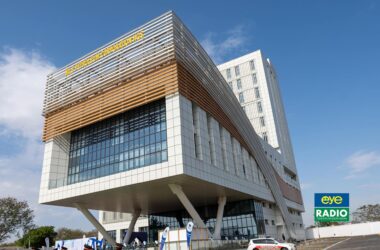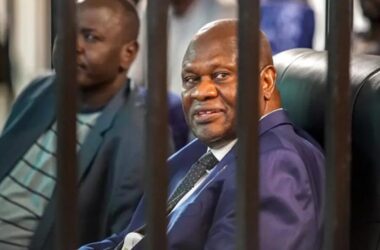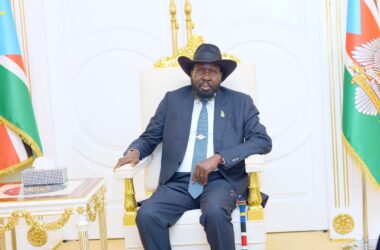By Kei Emmanuel Duku
South Sudan is drawing a hard line in the sand against becoming a dumping ground for polluting, second-hand air conditioners and refrigerators. Government environmental officials are spearheading a regulatory crackdown, but the business sector warns that loopholes are already rendering the efforts useless on the ground.
The move is part of a regional and global push to shield the ozone layer the planet’s natural Ultra-Violent protective shield from toxic industrial chemicals.
The Ministry of Environment and Forestry is leveraging regional cooperation and new domestic regulations to enforce the ban on appliances containing Ozone-Depleting Substances (ODSs) and potent greenhouse gases like Hydrofluorocarbons (HFCs).
Joseph Africano Bartel, the Undersecretary of the Ministry of Environment and Forestry, confirmed the new reality at the borders.
“Customs have been informed, and there is a harmonized system, because now Uganda will not allow, Kenya will not allow, and we will not allow and that is the partnership we are going to explore” said Bartel.
He emphasized the grave risk posed by these gases, which are used in freezing and air conditioning appliances. “These are ozone-depleting substances,” he stated, explaining that with the new regulations, they will ensure these chemicals are “not imported into the country.”
The push to control these chemicals is essential to global climate action. “It is one hole that all of us are working to make sure that it grows,” Bartel declared, referring to the depleted ozone layer. “If we control these substances, then we’ll be able to reduce the impacts of climate change on humanity.”
South Sudan National Ozone Officer, Kapuki Tongun, detailed the comprehensive regulatory steps being taken. She said the Ministry has drafted and validated an ozone depleting substances regulation and is working with Customs to implement the international Harmonious System (HS) of identifying items.
“We have requested customs to include the CFCs (Chlorofluorocarbons), HCFCs (Hydrochlorofluorocarbons), and HFCs for their control substances… When it reach the border, they should return on their importer’s cost.”
The National Ozzone officer stated with all the control measures in place, it means controlled substances will be identified instantly, and any non-compliant shipment will be immediately rejected at the border a major step toward enforcement.
Beyond imports, the Ministry is focusing on the local workforce where technicians and importers will be trained to handle these appliances, she announced a major effort to ensure competency.
“We are looking forward to establish that licensing scheme-for technicians, together with the Ministry of Labor and the Ministry of Education,” adding that continuous awareness is necessary to ensure technicians “understand the behavior of the new refrigerants.”
Despite the government’s rigorous planning, a senior figure in the business community warned that the entire ban could be rendered ineffective by a major loophole.
Yowa Soso, the Deputy Secretary General for the South Sudan Chamber of Commerce, pointed out that the majority of polluting second-hand appliances are not arriving in large cargo freights that require Ministry of Trade certification.
“A lot of time, most of these used refrigerators and air conditioners don’t come as a freight container. In most cases they come as personal effects.”
Soso argues that as long as people living abroad can import toxic used items as personal baggage, they will bypass all official regulation. “If you go around Juba, you will find a store where everything is there,” he noted, citing the government’s previous failure to regulate items like used vehicle tires.
Soso urged the Ministry to shift its focus from the receiving end to the source: “I recommend to the Ministry, we need to look at that keenly and address it. Sometimes it can be restricted from the port of import, from where they are coming.” He lamented the perception that without strict controls, foreign nations view the continent as a place “where we can do what?” implying a dumping ground for pollutants.
According to European Union Climate Action, the primary cause of ozone depletion is the emission of Ozone-Depleting Substances (ODSs), especially Chlorofluorocarbons (CFCs), which release chlorine and bromine atoms that destroy ozone molecules. These man-made compounds were historically used as refrigerants, spray propellants, and in fire extinguishers (Halons).
Due to rapid loss of the ozone layer this crisis led to the Vienna Convention and the Montreal Protocol, which controlled the original ODSs. When new replacements, Hydrofluorocarbons (HFCs), were found to be potent greenhouse gases that exacerbate global warming, the Kigali Amendment was introduced to phase them out.
Undersecretary Joseph Africano Bartel notes that while the ozone layer has “really reduced,” the global action aims to ensure the “one hole” in the atmosphere continues to heal. South Sudan as a contributor to global climate change mitigation, the countrry is expected to cut its global emissions, specifically through the control and eventual ban of these polluting gadgets.




